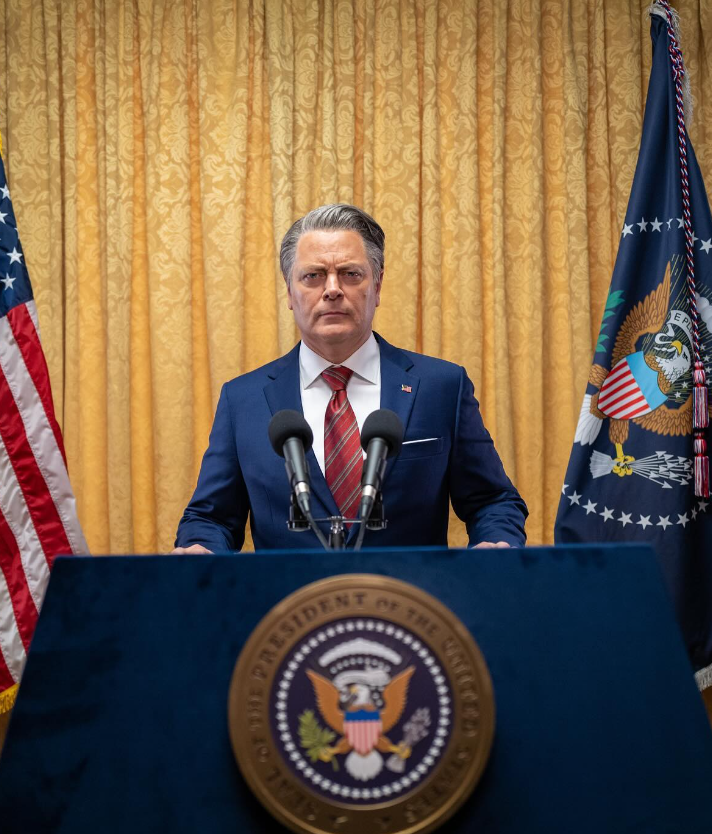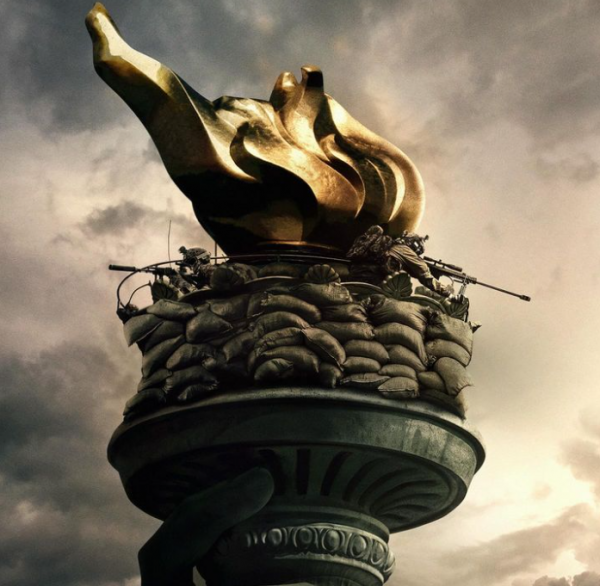
Print & Features Editor Jess Parker reviews Alex Garland’s divisive Civil War… and finds it to be disturbingly timely viewing
Writer and director Alex Garland’s latest feature film, Civil War, landed in UK cinemas on 12 April 2024. With a budget of $50 million, the flick is both indie production house A24 and Garland’s most expensive feature film project to date. Civil War takes place in a pseudo-contemporary USA: a war-torn dystopia that feels eerily comparable to 2024’s America and its current political tensions.
Plot Overview:
Civil War’s plot is predominantly self-contained despite the visceral grandeur of Garland’s America-at-war. The film follows famed photographer Lee Smith (Kirsten Dunst), journalists Joel (Wagner Moura) and Sammy (Stephen McKinley Henderson), and aspiring war photographer Jessie (Cailee Spaeny) as they embark on a road trip towards Washington D.C., hoping to track down and interview the president (Nick Offerman) in the White House as his forces crumble against the rebel factions.
Dunst is a forceful lead, embodying a pessimistically resigned attitude towards her work and the trauma that she documents. Although hers isn’t the most thrilling performance that you could imagine for a war film, Dunst’s reserved coolness acts as an effective foil to the intense events unfolding around her. Moura and Henderson put in impactful performances as Joel and Sammy, supporting Dunst’s lead with more emotional portrayals of the impacts of journalism and documenting history on the frontline. Jessie is an interesting character. Evidently mirroring an ambitious young Lee Smith, Jessie’s foolishly unrestrained and careless attitude towards dangerous situations is agonisingly annoying to audiences until Smith decides to nurture Jessie’s passion for photography, perhaps in the name of self-preservation.
The War Photographer:
Using the role of the war photographer as a narrative device, Civil War uses this artistic medium as a vehicle for placing the audience amongst the fighting as just that, an audience. We see the rarely documented view of the documentarian through both Jessie and Garland’s eyes, witnessing violence from the side-line of the frontline.
“Shooting film encapsulates the fleeting and oftentimes luck-based nature of war, with there only really being one ‘shot’ at each shot
Jessie chooses to shoot film as a budding photographer, a choice that has its filmic pros and cons. Shooting film encapsulates the fleeting and oftentimes luck-based nature of war, with there only really being one ‘shot’ at each shot. Jessie’s chosen medium feels raw and adds a layer of authenticity to her work, paired with a level of urgency. When you have 24-36 shots in a roll, you need to make sure that each one counts.
This choice, however, does affect the immersion of Civil War. I often found myself thinking, where on earth is she buying her film and developer? And if audiences are expected to believe that she has a bulk supply, how on earth is she carrying it? Although this became a bit of a nagging bugbear across Civil War’s nearly two-hour runtime, it ultimately does not detract from the thematic impact of the medium, negating my niggling qualms along the way.

Political Implications:
A24 and Alex Garland made a definite choice in releasing Civil War during one of the most globally significant election years in recent times. The film is a statement, built off of rocky foundations that could easily crumble as an effect of upcoming electoral and/or governmental decisions globally, making Civil War feel uncomfortably far from fiction.
Offerman’s president feels like an all too familiar figure, acting as a looming force in the face of country-wide destruction and antagonisation. Although his screentime is incredibly limited, this lends to his position as a corrupt political figurehead: preaching his message, yet never personally enacting on it and reaping the consequences of war. His performance is memorable in its absence, and impressive in its stoic authenticity.
“[Nick Offerman’s] performance is memorable in its absence, and impressive in its stoic authenticity
Something that Civil War could be faulted for on a surface level is its narrowed perspective. Following a group of privileged media-types, the film’s narrative feels as though it brushes past the experiences of women in modern warfare considering that two of its leads are women. I found myself questioning this factor, initially wondering whether this was a major lapse in narrative judgement. However, upon mulling it over, it feels as though Civil War’s tunnel vision perspective-wise is to its benefit. In narrowing its point of view, the film exists in the isolating impacts of violence and political unrest. Those that the film chooses to follow are exclusively preoccupied by their own narratives, capturing their individual experiences in the same manner that they decree the chosen documentations of war. Garland chooses to show us what is seen by our lead characters, acting as a secondary lens for the journalistic team’s accounts.
Verdict:
You need to watch Alex Garland’s Civil War as soon as you are able to. Narratively, the film is not the most ground-breaking war film ever made, however, during this global political turning point, Garland’s latest release feels like an ode to an immediate future that has every possibility of coming to be. The film will have you gripped from start to finish, pondering how dystopian this dystopia really is, and wondering what your place in this world may hypothetically come to be. Civil War is brutal, quick, and upsettingly of-our-world. Forget ‘must-watch’, Civil War is a ‘watch now’.
Rating: 5/5
Civil War is in cinemas now.
Enjoyed this article? Check out these other recent reviews from Redbrick Film:
Review: The End We Start From | Redbrick Film

Comments